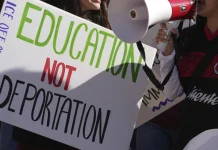

A new revision by the United States Citizenship and Immigration Services (USCIS) is expected to dampen international students’ prospects of getting a job in the US after graduating.
USCIS has reinterpreted the science, technology, engineering and mathematics (STEM) Optional Training (OPT) extension rule to require that these STEM graduates be placed inhouse at their employer’s worksite only, law firm Lewis Rice LLC wrote in Lexology. Third-party employment placements are no longer allowed.
This “significant change” applies to the 24-month extension of post-completion OPT international students in STEM courses are eligible for after graduating.
“USCIS has now essentially prohibited off-site placement. The student’s training experience must take place on-site at the employer’s place of business or worksite(s), where US Immigration and Customs Enforcement (ICE) has authority to conduct employer site visits to ensure that the employer is meeting program requirements,” Lewis Rice LLC wrote.
International students on F-1 study visas are allowed to work in the US for 12 months under the OPT program. Those with STEM degrees from Student and Exchange Visitor Program (SEVP)-certified and accredited US colleges and universities are eligible for a further 24-month OPT extension.
USCIS guidelines state that “The employer’s training obligations” must now take place “onsite at the employer’s place of business or worksites to which US Immigration and Customs Enforcement (ICE) has authority to conduct site visits to ensure the OPT requirements are being met”.
“The training experience may not take place at the place of business or worksite of the employer’s clients or customers because ICE would lack authority to visit such sites.”
Remote work will now be prohibited too: “The employer may not fulfill its training obligation to provide a structured and guided work-based learning experience by having the student make periodic visits to the employer’s place of business to receive training, while the student is actually working at the place of business or worksite of a client or customer of the employer. For the same reason, online or distance learning arrangements may not be used to fulfill the employer’s training obligation to the student.”








